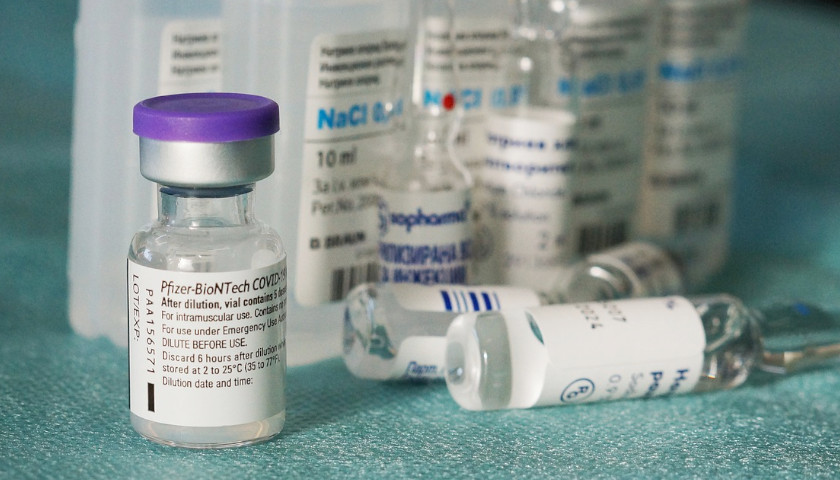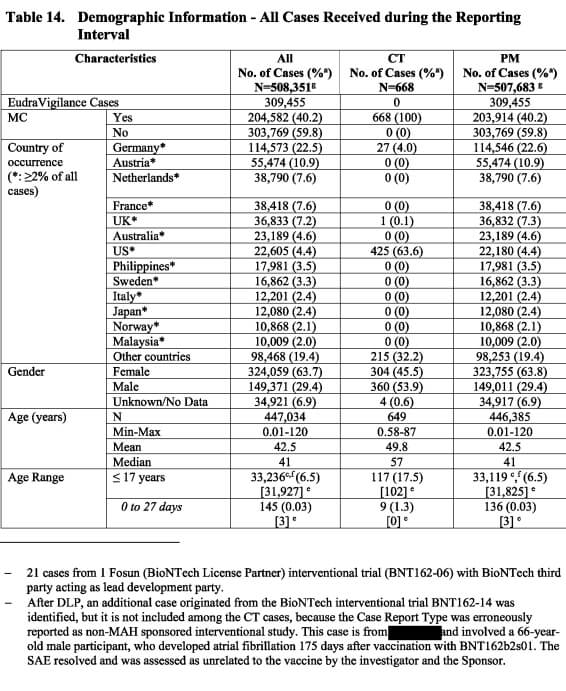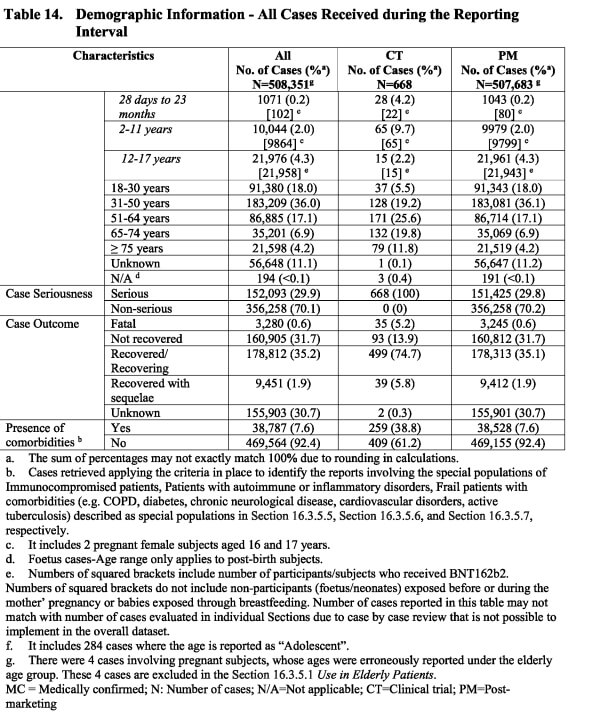by Debra Heine
By June of 2022, Pfizer had identified over 10,000 categories of nearly 1.6 million adverse events, a recently-released safety update report shows. Pfizer’s pharmacovigilance documents were requested and released by the European Medicines Agency, the EU’s drug regulator, Conservative Review’s Daniel Horowitz reported on Wednesday.
The 396-page confidential Pfizer report, dated August 18, 2022, reveals that Pfizer was well aware its product was causing an unacceptable level of serious and debilitating injuries early on.
In the reporting period of December 19, 2021 through June 18, 2022, the company observed 1,597,673 adverse events in 508,351 case reports—one-third of them classified as serious.
The report also shows that women reported adverse events at three times the rate of men, although many of their complaints were not considered serious.
Signals that were addressed and inexplicably “determined not to be risks” include heavy menstrual bleeding, loss of taste and smell, Appendicitis, Hemolytic Anemia, uveitis, flareups of autoimmune disease and inflammatory disorders, and vasculitis. Signals that were determined to be important identified risks included Anaphylaxis, Myocarditis and Pericarditis. “Hearing loss” was catalogued as an “ongoing signal.”
The report also acknowledged that Vaccine-Associated Enhanced Disease (VAED) and Vaccine-Associated Enhanced Respiratory Disease (VAERD) were important potential risks of taking the shot. The report indicated that it was “missing information on the potential risks for pregnant or breastfeeding mothers, immunocompromised individuals and use in frail patients with comorbidities. Regardless, the mRNA injections were strongly recommended for everyone, and for most working aged individuals, it was mandated.
The highest number of cases thus occurred in the 31-50 year-old group, 92 percent of whom did not have any comorbidities prior to the jab.
The Pfizer data also shows that more than 60 percent of cases were classified as either “outcome unknown” or “not recovered,” indicating that a concerning number of the injuries were long term. Only 35 percent were listed as recovered or recovering.
Conservative Review also highlighted a recently released Pfizer summary documenting “serious and non-serious adverse reactions from post-marketing data sources” dated “as of June 18, 2022.”
The data show:
• Pfizer was aware of 73,542 cases of 264 categories of vascular disorders from the shots. Many of them are rare conditions.
• There were hundreds of categories of nervous system disorders, totaling 696,508 cases.
• There were 61,518 AEs from well over 100 categories of eye disorders, which is unusual for a vaccine injury.
• Likewise, there were over 47,000 ear disorders, including almost 16,000 cases of tinnitus, which even Mayo Clinic researchers observed as a common but often devastating side effect early on.
• There were roughly 225,000 cases of skin and tissue disorders.
• here were roughly 190,000 cases of respiratory disorders.
• Disturbingly, there were over 178,000 cases of reproductive or breast disorders, including disorders you wouldn’t expect, such as 506 cases of erectile dysfunction in men.
• Very disturbingly, there were over 77,000 psychiatric disorders observed following the shots, lending credence to Dr. Peter McCullough’s research observing case studies showing psychosis correlating with vaccination.
• 3,711 cases of tumors – benign and malignant
• Of course, there were almost 127,000 cardiac disorders, running the gamut of about 270 categories of heart damage, including many rare disorders, in addition to myocarditis.
• There were over 100,000 blood and lymphatic disorders, for both of which there’s a wealth of literature linking them to the spike protein.
“When reading what Pfizer knew early on juxtaposed to independent studies, it’s clear that nobody could have mistaken most of these AEs for mere incidental ailments,” Horowitz wrote.
Here is a list of 3,129 case studies chronicling vaccine injury in every organ system observed in this Pfizer document.
What is so jarring is that there are hundreds of very rare neurological disorders that reflect something so systemically wrong with the shots, a reality that was clearly of no concern to the manufacturers and regulators alike. One of the infamous cases of vaccine injury was Maddie de Garay, an Ohio teen who became disabled for life immediately after participating in the Pfizer clinical trial. Her story is chronicled in chapter 16 of my book. I checked this confidential document and found that they knew of 68 cases of her rare diagnosis, chronic inflammatory demyelinating polyneuropathy.The broad scope of injuries affecting every single organ system is simply extraordinary. Yet to this day, the FDA continues to criminally label the Pfizer shot as safe and effective. To this day, the label indicates the shot is a fully protective vaccine and also fails to mention all of these side effects, as required by law.
Back in January, Dr. Peter Doshi, editor of the British Medical Journal, and eight other doctors and scientists from the Coalition Advocating for Adequately Labeled Medicines (CAALM) submitted a petition to the FDA requesting changes to FDA-approved labels for the Pfizer and Moderna COVID-19 mRNA shots. The petitioners asked the FDA “to make critical changes to official product labels,” that would reflect the vaccines’ lack of prevention of transmission or infection and the significant safety risks.
Specifically, the group asked that they include the following side effects on the label: “multisystem inflammatory syndrome in children, pulmonary embolism, sudden cardiac death, neuropathic and autonomic disorders, decreased sperm concentration, heavy menstrual bleeding, and detection of vaccine mRNA in breast milk.”
In their reply, the FDA denied the causal relationship between any of these side effects and the COVID shots.
The FDA also dismissed the request that officials clarify on the label that the shots don’t stop transmission, saying: “We are not convinced that there is any widespread misconception about this.”
In an op-ed published last week in The Hill, Doshi, Linda Wastila, Ph.D., and Kim Witczak wrote that the FDA rejected their petition even though the current labels are “obsolete, misleading and out of touch with regulators elsewhere.”
The authors said “product labeling should be informative and accurate, not promotional. The law requires it, and following the law shouldn’t be optional.”
– – –
Debra Heine reports for American Greatness.










